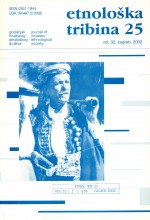Tradicijski život Mađara i Nijemaca u Retfali, dijelu Osijeka
Traditional Life of the Hungarians and the Germans in Retfala, a Part of Osijek
Author(s): Vlasta ŠabićContributor(s): Sanja Kalapoš Gašparac (Translator)
Subject(s): Customs / Folklore, Cultural Anthropology / Ethnology, Rural and urban sociology, Ethnic Minorities Studies
Published by: Hrvatsko etnološko društvo
Keywords: minority communities; Hungarians; Germans; Osijek;
Summary/Abstract: A revision of some historical facts points to a firmer connection of the city of Osijek and its neighboring villages in the past. Namely, there have been some rural elements that have been incorporated in the city and have survived for quite a while, and at the same time the urban environment has influenced the surrounding villages. The way of life in Retfala was determined by the economy, which was based on the agriculture, the crafts, and, after the World Wars, on the employment in the city of Osijek and its factories. One of the determining elements was certainly the immanent connection with the city of Osijek, which gave Retfala a specific tone The everyday life in Retfala, its material and spiritual culture was defined by two groups of its inhabitants - the Hungarians and the Germans. The petrification of the traditional elements was up to recently caused by the fact that these two communities are somewhat closed national minority units. Retfala used to be a village until it was united with Osijek in 1947. The elements of the traditional way of life from the beginning and the first half of the twentieth century witness to this fact: economy; rural architecture, largely characterized by the Pannonian, that is, the Slavonian architecture, such as the typical houses called trščare built of what used to be called naboj of ćerpić; some elements of traditional costume, that is, the specific features of clothing; calendar customs, which are commonly recognizable by their Central European roots; customs that accompanied work, as well as the social life seen from the prism of leisure time.
Journal: Etnološka tribina : Godišnjak Hrvatskog etnološkog društva
- Issue Year: 32/2002
- Issue No: 25
- Page Range: 105-121
- Page Count: 17
- Language: Croatian

